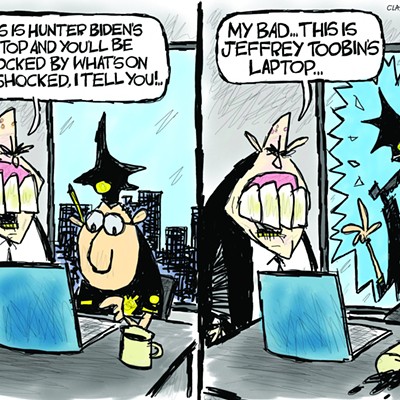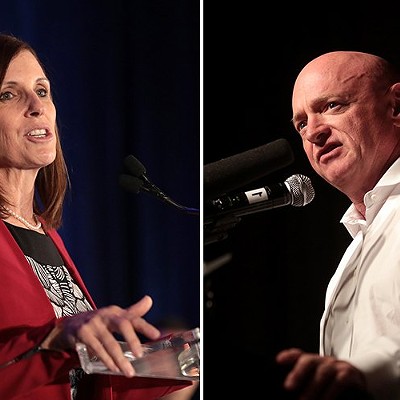And the truth is, none of the pummeled victims are to blame. Instead, General Motors or Raytheon is. Or maybe it's Wal-Mart, ExxonMobil or any other massive corporate entity in control of that husband's fate. But whatever it is, it's too big to hit. Even the guy who did the actual firing is just another poor schmuck who's only doing his job.
Societies behave this way, too.
The ancient Romans relieved the stress of political and environmental upheavals by sticking it to the Carthaginians.
In the 19th century, the British tried to exterminate--or failing that, impoverish--the Irish who objected to the fact that virtually all the food they produced was being exported to feed British subjects. (This, to the chagrin of some Weekly readers, is why I am here. Of the nine family members who boarded the rattrap moored in Liverpool harbor in 1855 to escape the Irish famine, three survived to reproductive age.)
Then there were the pogroms of Tsarist Russia in the late 19th and early 20th centuries. Thousands of Jews were killed or driven from their lands by mobs of angry peasants who believed they were the cause of their poverty. They weren't, of course; the greed of the aristocracy was. The Jews however, made a good scapegoat.
The best scapegoat the average American can come up with these days is Mexican. Sept. 11, 2001 scared us, but instead of a reasoned response, the administration in Washington, D.C., started an incomprehensible war with a country that had nothing to do with these heinous attacks, leaving most reasonable people to wonder how, with billions of dollars being poured into this war, there could possibly be enough left over to ferret out and prevent whatever future terrorist plots were being hatched next.
Fear and paranoia rise higher in this country every day, and the flames are fanned by both exaggerated and real-life concerns. The fact that 50 million Americans have no health insurance is genuinely frightening, as is the fact that one of our oldest and most cherished cities was recently flooded by Hurricane Katrina. Global warming is very frightening, as are plagues of pathogens and insects occurring as a result. It is very frightening that if you want your kids college educated, you have to take out a second mortgage on your house, if you're lucky enough to own one. Dick Cheney is frightening, and I'm sure Donald Rumsfeld's face is the stuff of many children's nightmares. Sexually transmitted diseases and crystal meth? Do I even have to say it? And have you checked out school children lately? Man, some of them are fat. All these things are very scary indeed.
What's not frightening, however, is the fact that the lady next door's cleaning woman may be undocumented. Nor is it scary that the guy unloading the lumber from a truck at a local building site prefers tortillas to English muffins.
Jon Kyl made border security a big part of his Senate re-election campaign, accusing his opponent of being "weak" in this area. This strategy was confusing for a couple of reasons, and the logic seemed similar to the Bush administration's insistence that the war in Iraq has something to do with keeping terrorists from blowing up yet more of our buildings and people. The idea seems to be that if you assert a lie enough times, it will eventually become the truth. It doesn't. In 2003, it was false that starting a war in Iraq would prevent future terrorist attacks on American soil, and it is still false today. It is equally false to insinuate that the terrorists came in through Mexico, and highly unlikely that they ever will. Yet "secure borders" has become a paranoia catch phrase, like "war on terror," that has very little to do with the problems facing most American citizens.
The Mexican nationals who enter this country illegally should not elicit the amount of hostility and xenophobia they have recently. The reason politicians have parlayed immigration into such a charged issue? It's easy. Who better to take out our collective malaise on than the poor and the desperate? It's a cynical ploy, engineered to prey on fear and our most uncharitable instincts. And the truth is, almost anybody when faced with the choice of feeding their families and illegally crossing a border, or letting their loved ones starve or fall prey to disease, would make the exact same choice.
Being American isn't a virtue, and being poor isn't a crime. They are both simply accidents of birth.






